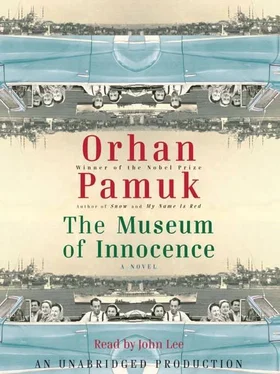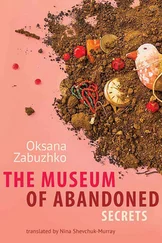In the run-up to New Year’s there would be thousands of vendors selling tickets for the National Lottery in the streets of Istanbul, and some would go dressed as Santa Claus into the wealthy neighborhoods. One evening in December 1980, when I was choosing what tombala presents to take to Füsun’s house, I saw a small mixed group of lycée students deriding one such Santa Claus, pulling his beard of cotton wool and laughing. When I drew closer I saw that this man was the janitor of the apartment house across the street; as the teenagers tugged at his cotton wool mustache, Haydar Efendi stood there silently, holding his tickets, his eyes downcast. A few years later the conservatives’ anger at the drinking and gambling during the celebration overflowed when Islamists set off a bomb in the Marmara Hotel on Taksim Square, in the patisserie that had been decorated for New Year’s with an enormous pine tree. At the Keskin dinner table, I recall, the bombing was, of course, an urgent topic, but it was nothing compared to what happened to the belly dancer who was expected to appear on a New Year’s Eve telecast. When Sertap, the most famous belly dancer of the day, appeared on television in 1981 despite the angry diatribes in the conservative press, we were dumbfounded, along with almost everyone else in the country. The TRT management had draped the beautiful and curvaceous Sertap in so many layers that not only were her “world-famous” belly and breasts covered, but even her legs.
“They might as well have veiled her, the disgraceful buffoons!” said Tarık Bey. Actually he hardly ever got angry at the television, and no matter how much he’d had to drink, he never shouted at the screen the way the rest of us did when sufficiently annoyed.
For some years, I’d been buying a Saath Maarif Takvimi , the calendar indicating the prayer times, from Alaaddin’s shop to take to Aunt Nesibe’s as a tombala present. On New Year’s Eve, 1981, it was Füsun who won it, and at my insistence she tacked it on the wall between the television and the kitchen, but no one would pay attention to the pages on days when I wasn’t there, despite there being a poem of the day, a daily note about the historical events whose anniversary it was, and a picture of a clock face, so that those who could not read and write might know the prayer times, as well as recommended recipes, historical anecdotes, and a bit of wisdom.
“Aunt Nesibe, you’ve forgotten to pull the page off the calendar again,” I would say at the end of the evening, when the soldiers would be saluting the flag as they goose-stepped across the screen, and we would have polished off a lot of raki .
“Another day is over,” Tarık Bey would say. “Thank God we are not hungry or without shelter, that our stomachs are full, that we are sitting in a warm house-what more could a person want in life?”
For some reason it lifted my heart to hear Tarık Bey say these homely words as the evening wound down, and so-even though I’d noticed on my arrival that they’d forgotten to pull the page off the calendar-I would omit to mention it until the moment I was about to leave, when I was ready to hear this thanksgiving.
“The most important thing is that we’re here all together, with our loved ones,” Aunt Nesibe would add. As she said this, she would lean over to kiss Füsun, and if Füsun was not at her side, she would call out, “Come here, my little storm cloud, so that I can give you a kiss.”
Sometimes Füsun would assume a little girl’s expression and sit on her mother’s lap, allowing Aunt Nesibe to spend a long time caressing her, kissing her arms, her neck, her cheeks. No matter how mother and daughter were getting along, they kept up this ritual through the eight years. As they laughed and kissed and hugged, Füsun knew full well that I was watching her, but she never looked back at me directly.
There were times, too, when, after Aunt Nesibe pronounced her wisdom about “loved ones,” Füsun would not go to her mother’s lap, but instead would take a neighbor’s child, a fast-growing boy called Ali, onto her lap, and after caressing him and showering him with kisses, she would say, “Time for you to go home now, or else your parents will get angry at us for keeping you.” Finally, there were the occasions when Füsun was in a bad mood, because she and her mother had argued that morning, and at Aunt Nesibe’s plea, “Come over here, my girl,” she would say, “Oh, Mother, please!” leaving Aunt Nesibe to say, “Then at least pull the page off the calendar, so we don’t get our days confused.”
This would leave Füsun all smiles suddenly, and after getting up to pull the page off the Saath Maarif Takvimi , she would read out the day’s poem and the recipe in a loud semitheatrical voice and laugh. Aunt Nesibe would comment, “Oh, what a good idea, let’s make quince and raisin compote, it’s been ages,” or, “Yes, they’re suggesting artichokes, but you can’t pick artichokes when they’re still small enough to fit in the palm of your hand.” Sometimes she would ask a question that unsettled me: “If I made a spinach pastry, would you eat it?”
If Tarık Bey didn’t hear her or was too gloomy to answer, then Füsun would turn to scrutinize me in silence, with a sadistic curiosity based on the expectation that I would not dare presume the prerogative of a full member of the family by telling Aunt Nesibe what to cook.
I knew how to rescue myself from this difficult bind, saying, “Füsun loves savory pastries, Aunt Nesibe, so you should definitely make it!”
Sometimes Tarık Bey would ask his daughter about the important historical dates on the page she’d torn off the Saath Maarif Takvimi , and she’d read aloud: “On September 3, 1658, the Ottoman army began its siege of Doppio Castle.” Or “On August 26, 1071, after the Battle of Malazgirt, Anatolia opened its doors to the Turks.”
“Hmmmm, let’s have a look at that,” Tarık Bey would say. “They’ve misspelled ‘Doppio.’ Here, take it back, and read us the saying of the day.”
“Home is where the heart is, and where we fill our stomachs,” Füsun said, reading in a mocking voice until our eyes met and she turned serious.
Suddenly we all fell silent, as if each was pondering the deeper meaning of those words. After Füsun had finished reading and had put the leaf from the calendar to one side, I picked it up, pretending I wanted to read it for myself, and when no one was looking, I put it into my pocket.
Of course, the pilfering wasn’t always so easy, but I have no wish to make myself more risible by going into the full details of my difficulties in acquiring so many objects of such varying size and preciousness from the Keskin household. Let an example from the end of New Year’s Eve 1982 suffice: Before I left the house with the little handkerchief I’d won at tombala, little Ali, the neighbor’s boy, who grew more in awe of Füsun with every day, came up to me and in a manner quite unlike his usual naughty self he said, “Kemal Bey, you know that handkerchief you won…”
“Yes?”
“That’s Füsun’s hankie from when she was a child. May I see it again?”
“Oh, I have no idea where I put it, Ali, my boy.”
“But I know,” the brat replied. “You put it in this pocket, so it must be there.”
He almost managed to invade my pocket with his hand, but I took a step backward. The rain was pelting down outside, and everyone had gathered at the window, so no one else heard what the child said.
“Ali, my boy, it’s getting very late, and you’re still here,” I said. “Your parents will blame us.”
“I’m going, Kemal Bey. But are you going to give me Füsun’s hankie?”
“No,” I whispered with a frown. “I need it.”
Читать дальше












